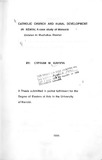| dc.description.abstract | Rural development focuses on the improvement of the
living conditions of the rural people, the majority of
whom have been neglected in the past by policy makers.
Indeed, it is a vital subject that most developing
countries cannot afford to ignore if they must attain
equitable redistribution of the National Cake. It is also
important that a genuine cooperation between the
Government, the local people and NGOs be encouraged so
as to realize meaningful rural development.
In view of this call, some christian churches have
positively contributed to the peoples' socio-economic
welfare not neglecting their religious role. A notable
example in this case is the catholic church in Kenya. She
has adopted a universal approach to salvation by
integrating evangelization with development.
Inspite of the vital role played by the catholic
church in rural development, little effort has been done
to study the various approaches used by the church. This
study therefore aims at investigating the role taken by
the Catholic Church in the field of rural development in
Makueni Division of Machakos District. In other
words, it hopes to establish the nature, extent and
impact of the church facilitated programmes in Makueni.
In order that we could attain our goal, three key
hypotheses were formulated. It was stated that the church
has initiated various development activities in Makueni
and that the local people are fully involved at all
stages. Secondly that the church and the Government of
Kenya have collaborated in order to attain a meaningful
rural development; and Lastly that the poor people may
not be benefitting much from these activities compared
to the rich.
A pilot study was then undertaken to test the
possibility of gathering enough data in the proposed
field of study. Alot of projects were unearthed in this
area. Makueni, Kaumoni and Kathonzweni locations were
then chosen to be the main area for our case study. The
various programmes found in the three divisions were
listed down and each category was studied on its own
merits. Questionnaires, interviews and participant
observation methods were adopted to ensure that the
relevant data could be gathered.
The study observes that the people of Makueni are
facing problems such as poverty, poor infrastructure,
exploitation by the rich and rural urban migration among
others. Having noted this the catholic church has
embarked on development activities hoped to improve the
people's social welfare. She has initiated income
generating projects, water projects, farming activities,
savings and credit cooperatives, Adult literacy, public
health and Family Planning Programmes. The study
concludes that these church activities have benefited
many people. However the rich and more so the powerful
have benefited most as opposed to the poor.
This is just compendium of the study. You are
therefore invited to discover what the study has
discussed at length and make your own assessment | en |

